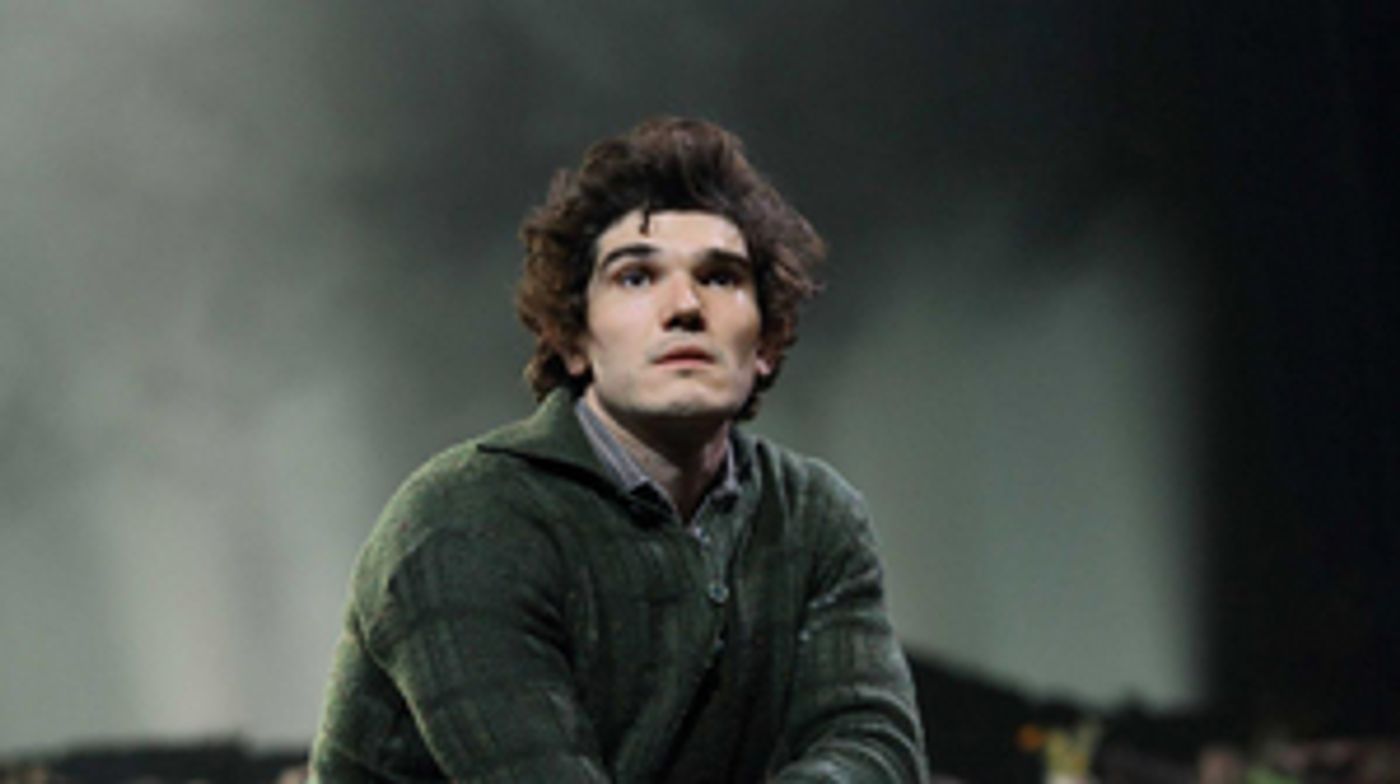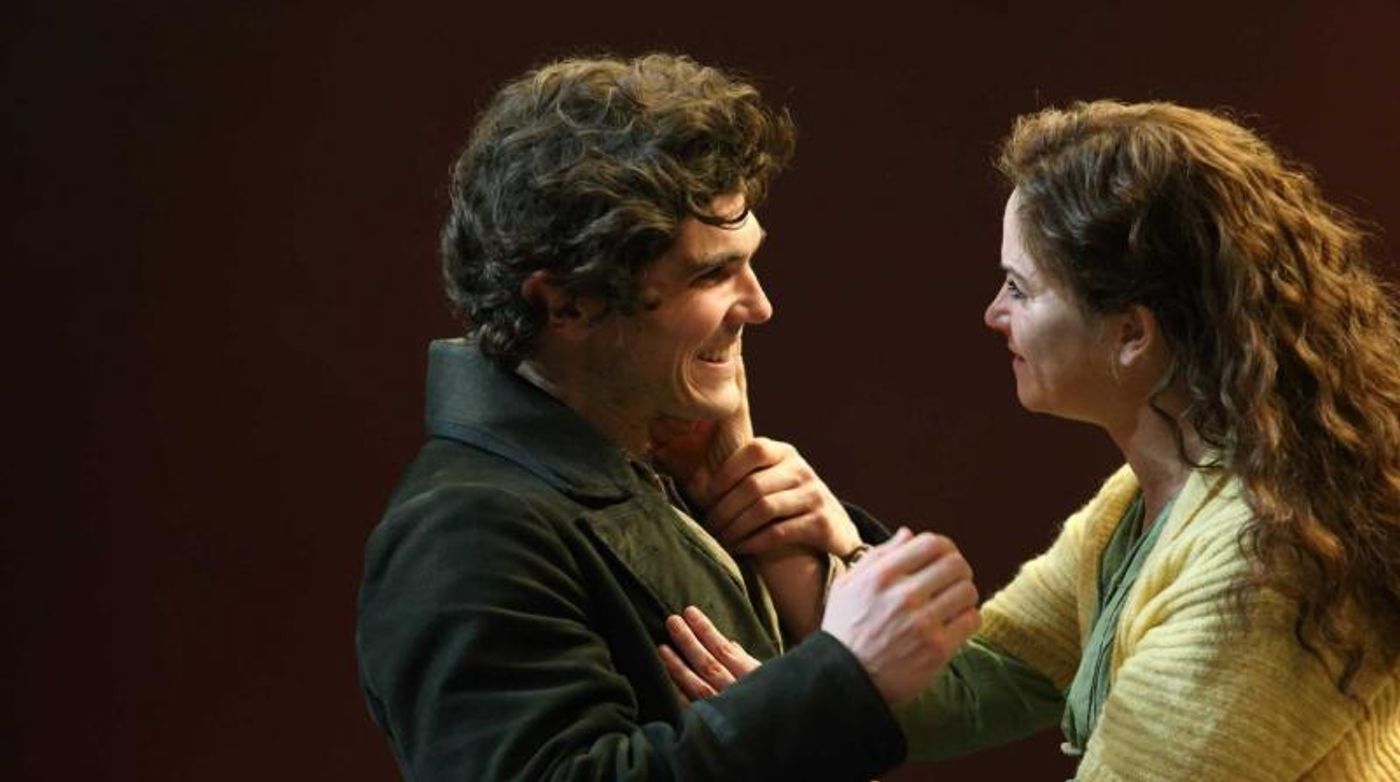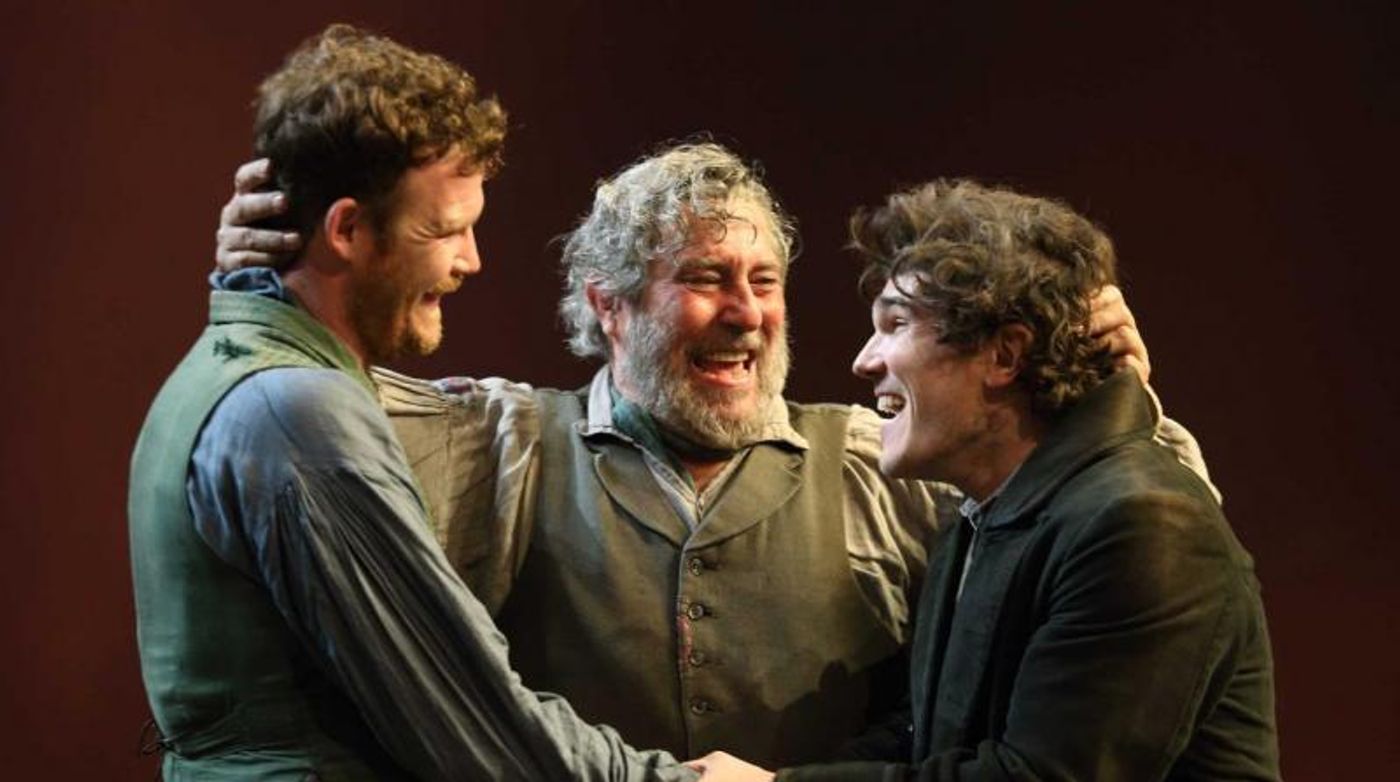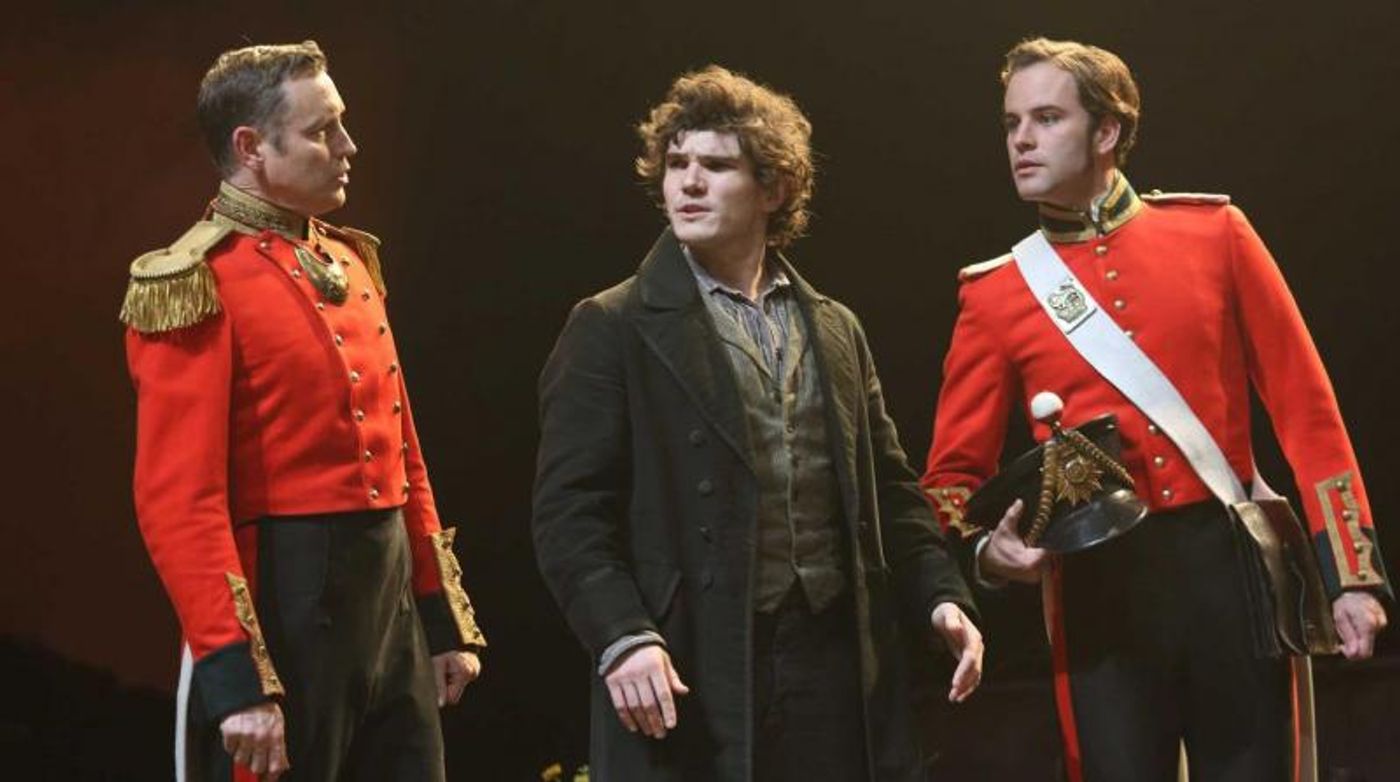Interview: Fra Fee Talks TRANSLATIONS

Following an incredible journey with The Ferryman through to Broadway, Fra Fee returns to London for Translations this year.
A revival of the sold-out, acclaimed run in 2018, the show is already wowing audiences once again. Talking to Fra during rehearsals, he spoke to us about joining the production and how appropriate the show is proving with British history then and now.
What's your earliest memory of theatre?
I have a few distinctive, early memories. One very significant one was when my older sister Claire was playing Mickey in her school's production of Blood Brothers. My Mum had asked me to go in and send for Claire to say we were outside.
And they were rehearsing the final scene of the show with "Tell Me It's Not True". I just remember being so hypnotised by what I was seeing on stage. I think that was my first experience of anything on stage (I was maybe about six or seven). So I didn't really know what drama was.
And it clearly had an impact!
Yeah - subsequently I then did as much as I possibly could!
My Da was very good at taking my sisters up to see plays, like in the Lyric Theatre in Belfast. And then we got into amateur dramatics which is a big thing back at home, because the only professional productions that are made are in Belfast.
So when you live out in the countryside in County Tyrone, that is literally a world away. So a lot of amateur community theatre is made there.
And was it the singing, the acting or the mix which enthralled you so much?
Well I was always able to sing and I was surrounded by music. In primary school, you learn to play the tin whistle and you're taught singing through Irish folk songs. So music was very much part of my world growing up.
And then my Da...who genuinely cannot sing (bless him!) I'm always one for saying everyone's got a voice, but my Da really struggles. But he is a really fine actor and he does a lot of theatre back home. So I think it was the musical world and his influence that meant I loved the marrying of the two.
After university (I did a music degree at Manchester) and at that stage, I figured doing a musical theatre post-grad was right for me at the time because it combined my two talents and my two interests.

in Translations
And Les Miserables came quite soon after your degrees, didn't it?
Yes and I really wanted to do it straight after... I say I wanted to do it, like I assumed I'd be in it!
That was the dream, whenever I did musical theatre at the Royal Academy of Music, playing Marius was like, "I think I could do that". And the audition was about a year or two post-graduation.
Funnily enough, I bumped into Hadley Fraser the other day - he's doing Antipodes here. And that was his first job, playing Marius and then I did Les Mis with him when he played Javert.
We're both very grateful for it, that show. It's a real rite of passage. I learned a lot and then to get to do the film at the same time, it was incredible.
And since then you've got to work across both musicals and shows, in both London and on Broadway with The Ferryman.
I feel very lucky that it's been very varied work. That's sort of been coincidental but also orchestrated in that I always wanted to vary my work as much as possible. So sometimes that mean I'd say no to certain things, and being careful of what I'd do next.
The Ferryman was the greatest gift of my life. I think it's one of the greatest plays written in the last twenty years, undoubtedly. The fact that it was a wonderful, new play by Jez [Butterworth] and directed by Sam [Mendes] at the Royal Court and then to Broadway. All that combined was amazing.
And they treat you very well over there. So you just felt part of something that was bigger than you, but being an integral part of it as well. And well all knew that and we all got on so well as a company.
Did you have to alter your accents at all?
We didn't alter our accents one bit. And I really respected Sam for that.
I thought we would have had to a little bit, but we didn't. We aimed for authenticity. I think there was one reference that we changed in terms of the text, but just because they simply wouldn't know what we were talking about.
And I believe it was richer in New York, because we had time to let it sink in. My favourite part of doing Broadway was re-rehearsing the play; you find so much more and dig deeper. I think that's the same with Translations too, quite a few of the cast that did this play last time are having that experience now.
So with Translations, was this your first time encountering the play?
I studied Philadelphia, Here I Come! by Brian Friel at school, and Translations was an accompanying text we read. So I knew it really well.
And also (thinking back to the amateur dramatics) my Da played Hugh in a local production of it back home. This actually gives you an idea of amateur dramatics: as a kid, I was backstage for every performance prompting everyone, because it was likely that someone would forget a line! So I actually read the play countless times as a kid.

and Fra Fee in Translations
Did you know much about the history, or did you learn it through the play?
Only through the play actually. Thinking back, I grew up with those anglicised versions of the place names back home. And you don't really think anything of it and you know that there is an Irish translation. Like I'm from Tyrone and then it's Tir Eoghain. But as a kid, I guess I never went, "Well when did that happen? Why was it changed?"
Of course, you learn Irish history at school but it's the big events. So this seemingly incidental event of the survey and the renaming, it was just another thing, this administrative thing. But the consequences of eradicating the culture of the people, it's just as significant as any other historical or political event.
It's hugely significant and that's why it's so wonderful that Brian Friel has put it into our consciousness.
And what did you make of your character?
I always loved the character of Owen, I really related to him. His boisterous energy and zest for life.
There's this need to get away, there's something not quite in communion with him there. He feels he needs to get away which he does, six years before the play starts he goes to Dublin.
I could really relate to that, as someone who did leave Ireland: moving across for university, to find their own place in the world.
And his place in that world and what's happening changes. His journey is very moving and really attracted me. Because he's part of that project, the surveying. I certainly don't think he realises the effect that it has. He firmly believes in it, he's pragmatic, he's progressive and knows he needs to in order to survive, he needs to be a part of this movement.
And then through the course of the play, he realises what he has done. That's quite a powerful thing to go through over the course of an evening.
You're in rehearsals as we speak. What's it like to join this company?
The company have been so welcoming. There were five that did it last year and five new ones, and it wasn't just a matter of us slotting into what they'd done before.
From the sense of the rehearsal room (which Ian Rickson leads so brilliantly), it felt like we were starting afresh. Because the relationship between myself and Hugh, for example, it would be differently to how it was done before. It immediately makes it a different play.
So we felt were all able to do new things and make mistakes.
And you previously performed here for As You Like It. Are you excited to return to the Olivier?
It's so lovely to return to the National and the Olivier in particular. It's a space that is just so vast and it can be intimidating. But oddly, it's really generous.
I mean the set is stunning, Rae Smith our designer has taken this hugely vast stage and landscape, but the focuses in on the hedge school. So it does feel very warm and cosy.
I sort of can't believe it, this extraordinary really important Irish play on this stage...pinch me!

Jack Bardoe in Translations
Finally, how do you think the play relates to and resonates with audiences today?
I think people now are living in a very confusing society. It's become so divisive and we're all trying to claim what it is to feel at home. And we're really struggling with that.
So when people come to see this play, it's about a community who are trying to define their own home, a home that is being forced to change by the forces around them, literally and also culturally.
And that is something that we are dealing with now. But there are certain lines that deal with borders and crossing borders. "'And you don't cross those borders casually - both sides get very angry," Jimmy Jack says. You're like, "How was this play written in 1980?"
So I think this isn't just about the Irish question, it was written as a response to the Troubles in 1980. But then Brian's point was that nothing had really changed in the hundreds and hundreds of year's of British occupation in Ireland. And similarly now unfortunately, it's a harsh reminder that that is still in jeopardy.
Translations at The National Theatre, through to 18 December
Powered by
|
Videos

